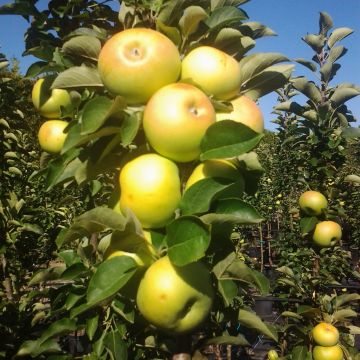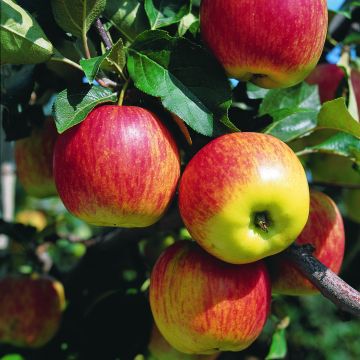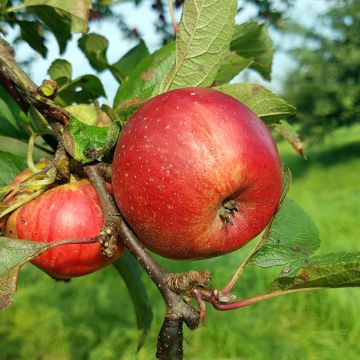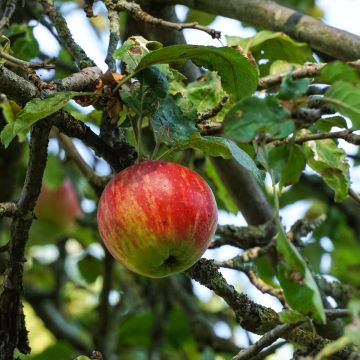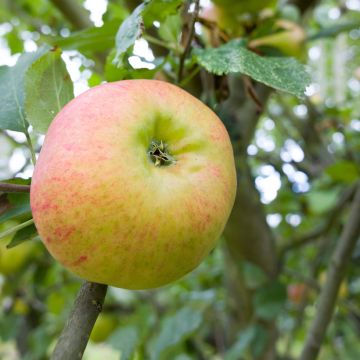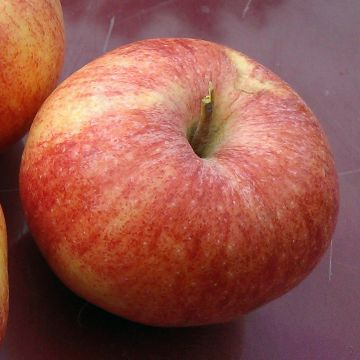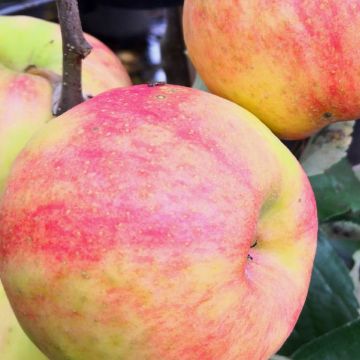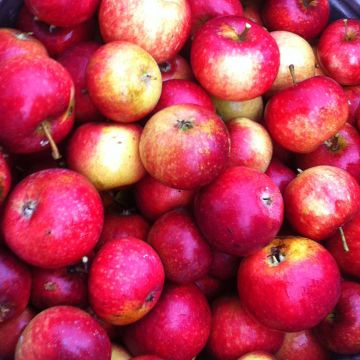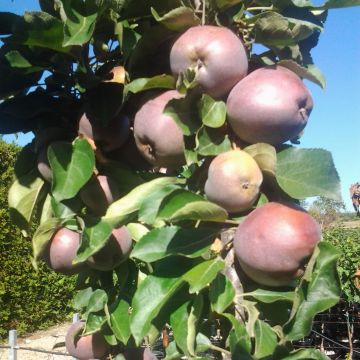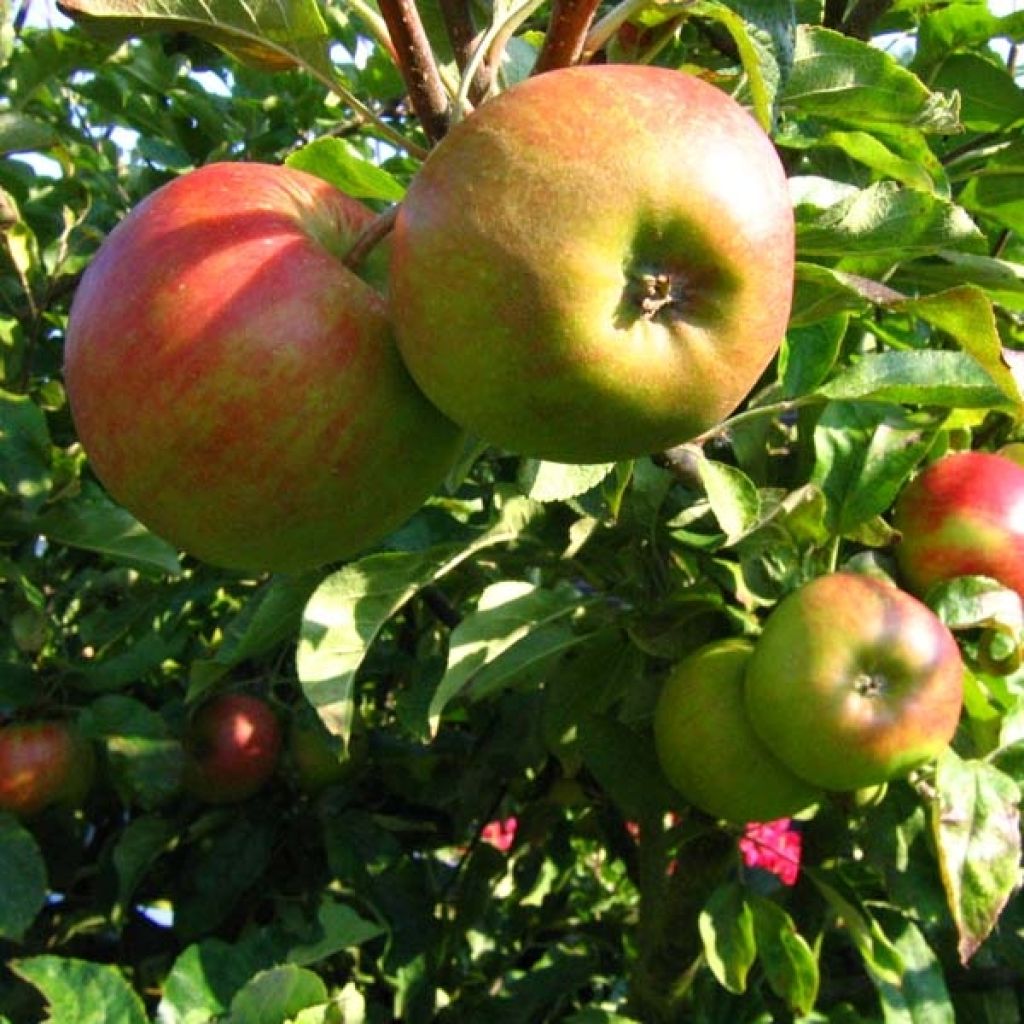

Apple Tree Elstar - Malus domestica
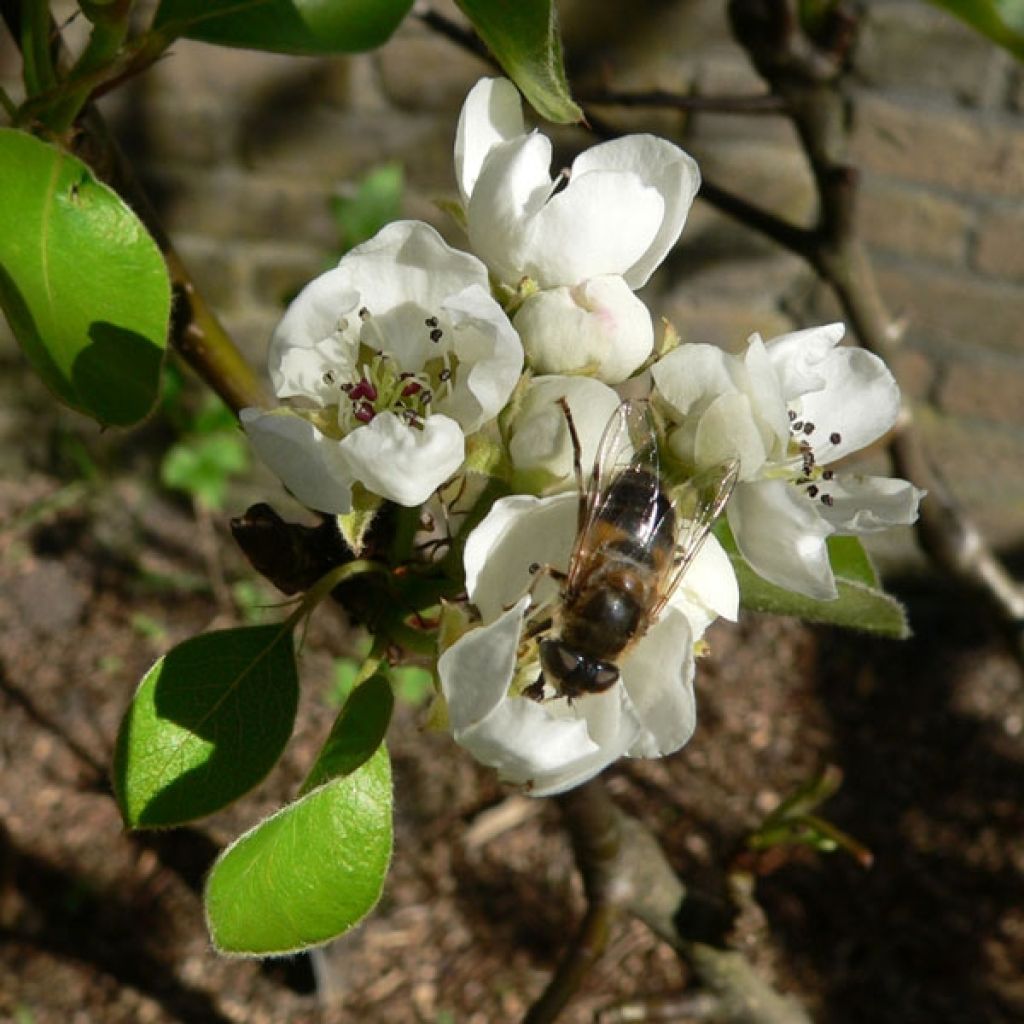

Apple Tree Elstar - Malus domestica
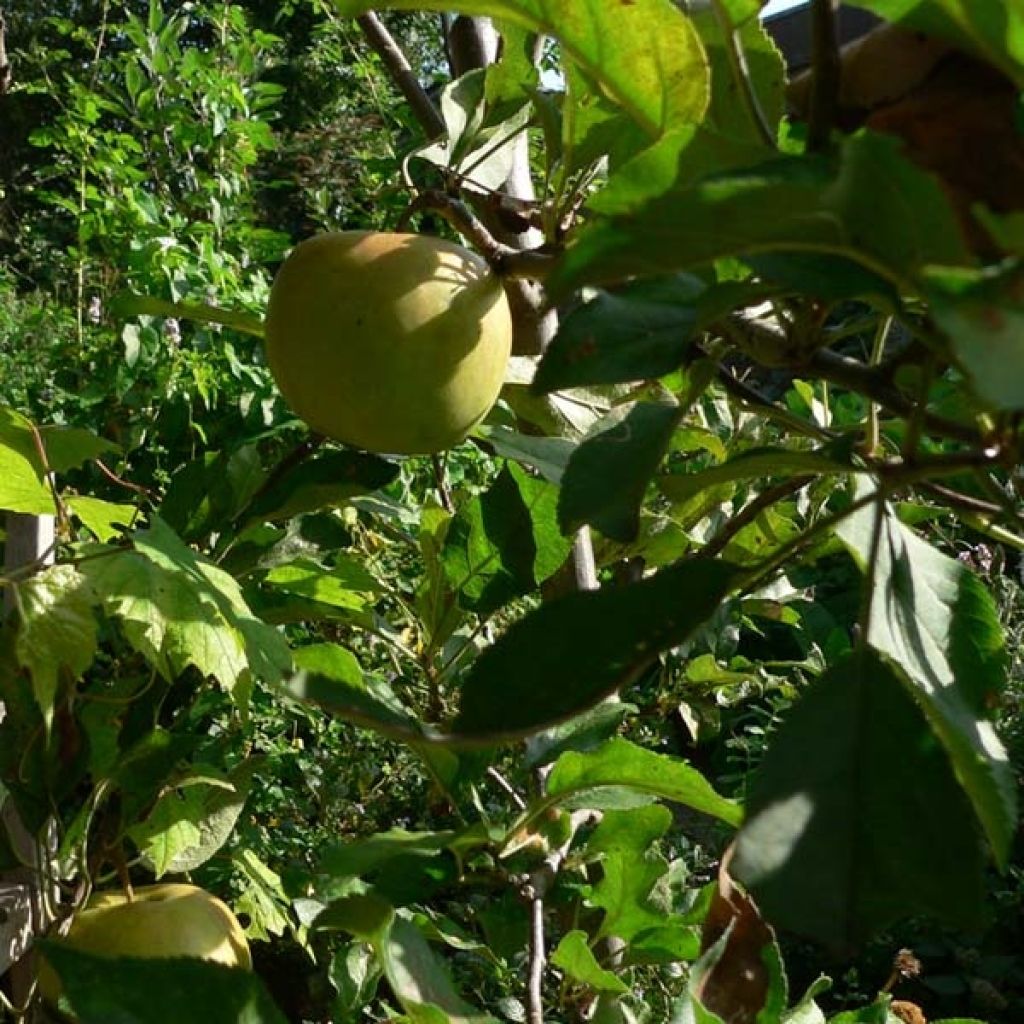

Apple Tree Elstar - Malus domestica
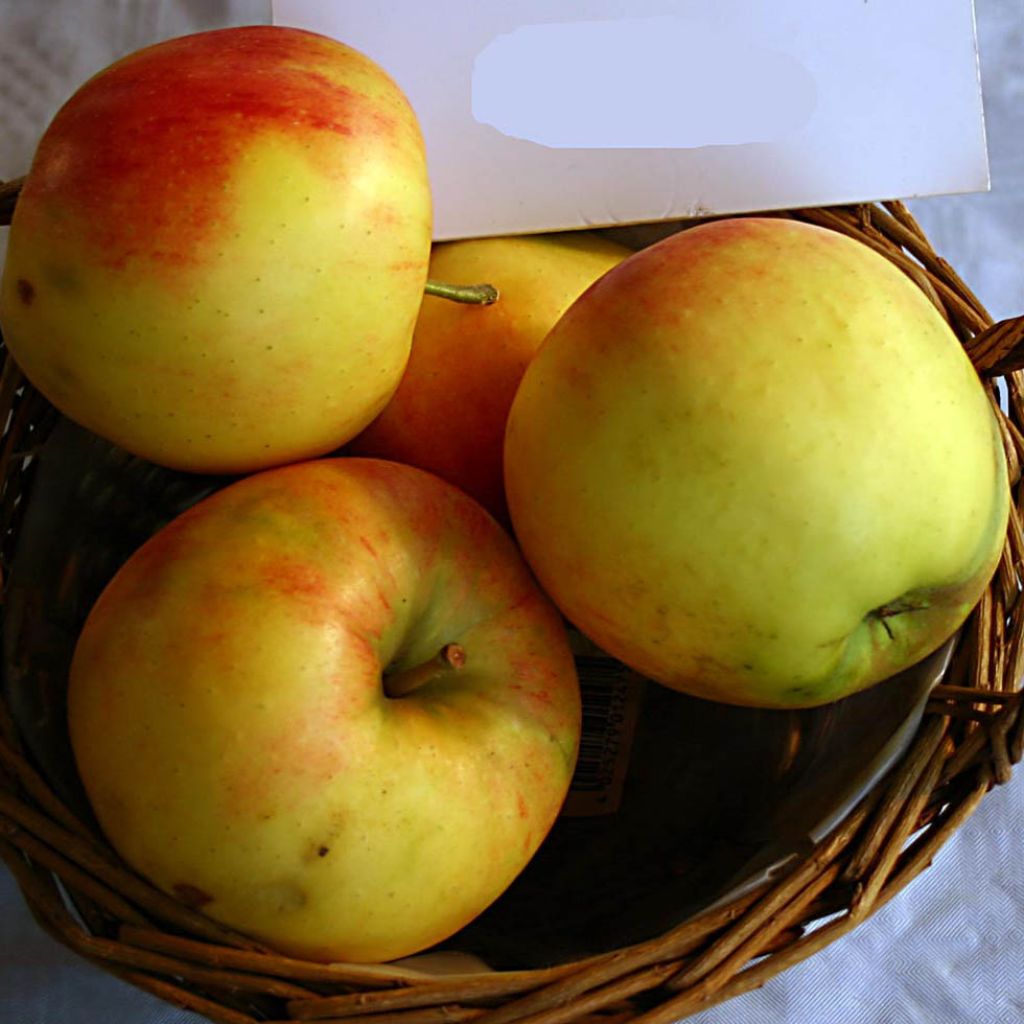

Apple Tree Elstar - Malus domestica
Apple Tree Elstar - Malus domestica
Malus domestica Elstar
Apple, Orchard apple, Table apple, Cultivated apple
Commandé le 26/11/22, livraison sans accroc, il a passé l'hiver et repart. Plus qu'à attendre les fruits !
Bruno, 23/04/2023
Special offer!
Receive a €20 voucher for any order over €90 (excluding delivery costs, credit notes, and plastic-free options)!
1- Add your favorite plants to your cart.
2- Once you have reached €90, confirm your order (you can even choose the delivery date!).
3- As soon as your order is shipped, you will receive an email containing your voucher code, valid for 3 months (90 days).
Your voucher is unique and can only be used once, for any order with a minimum value of €20, excluding delivery costs.
Can be combined with other current offers, non-divisible and non-refundable.
Home or relay delivery (depending on size and destination)
Schedule delivery date,
and select date in basket
This plant carries a 6 months recovery warranty
More information
We guarantee the quality of our plants for a full growing cycle, and will replace at our expense any plant that fails to recover under normal climatic and planting conditions.


Description
The Elstar Apple Tree is a relatively recent creation that has won over a very wide audience. This apple tree has a very good productivity. Reaching ripeness as early as early September, the apple is medium-sized, perfect for biting into, with a beautiful thin and smooth skin, yellow streaked with red. Its flesh is crisp, very sweet, and refreshing.
The variety 'Elstar' is the result of a cross-breeding between 'Golden Delicious' and 'Ingrid Marie' carried out in the Netherlands in 1955. It was named in 1972 and became popular among producers and the general public in the late 1970s. Its fruits are appreciated for being among the first to ripen, depending on the year and region, harvest takes place between early and mid-September. Highly aromatic, the fruits are pleasantly crisp and have a sweet to tangy flavour that is much appreciated. Their yellow skin streaked and spotted with reddish-orange at full ripeness is thin and digestible. Of a medium and regular size, it is a very good eating apple, excellent fresh without preparation, but it is also delicious in compotes and jellies. The fruits can be kept for a good part of the winter.
Left to grow freely, the 'Elstar' Apple Tree develops a roundish and semi-erect habit, with well-ventilated branching, acrotonous (favouring the growth of the highest branches over those located at the base of the tree). It is vigorous and hardy. However, it is quite susceptible to common apple parasites and diseases. Not enjoying the summer heat, it is well-suited for more northern regions and medium altitudes in mountainous regions. It is a medium-sized tree that is suitable for small gardens and produces large quantities of fruit. However, it may show a tendency towards alternate (biennial) bearing, meaning a year of high productivity may be followed by a year of low harvest.
Flowering takes place in April, at the same time or a few days before 'Golden'. Thanks to its pollinating qualities, Malus domestica Elstar helps to fertilise apple trees of other varieties that are nearby. For its own fruiting, it requires the proximity of an apple tree of another pollinating variety such as Gala, Golden Delicious, Cox Orange, Reine des Reinettes, Granny Smith, Belchard, or Melrose. Indeed, like many apple trees, it is not very self-fertile.
Report an error about the product description
Apple Tree Elstar - Malus domestica in pictures
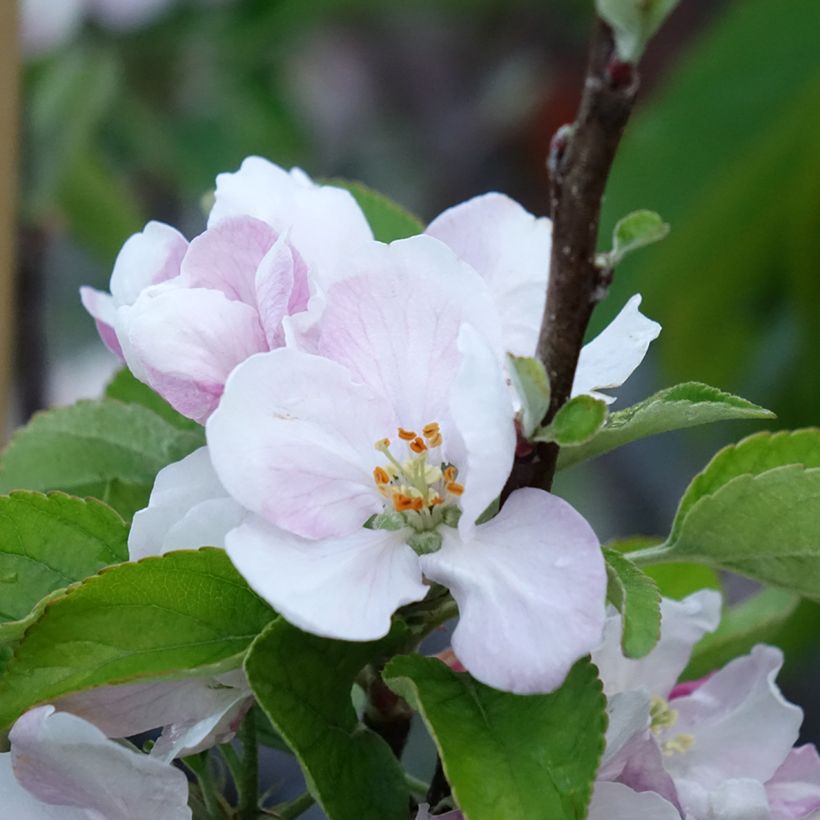

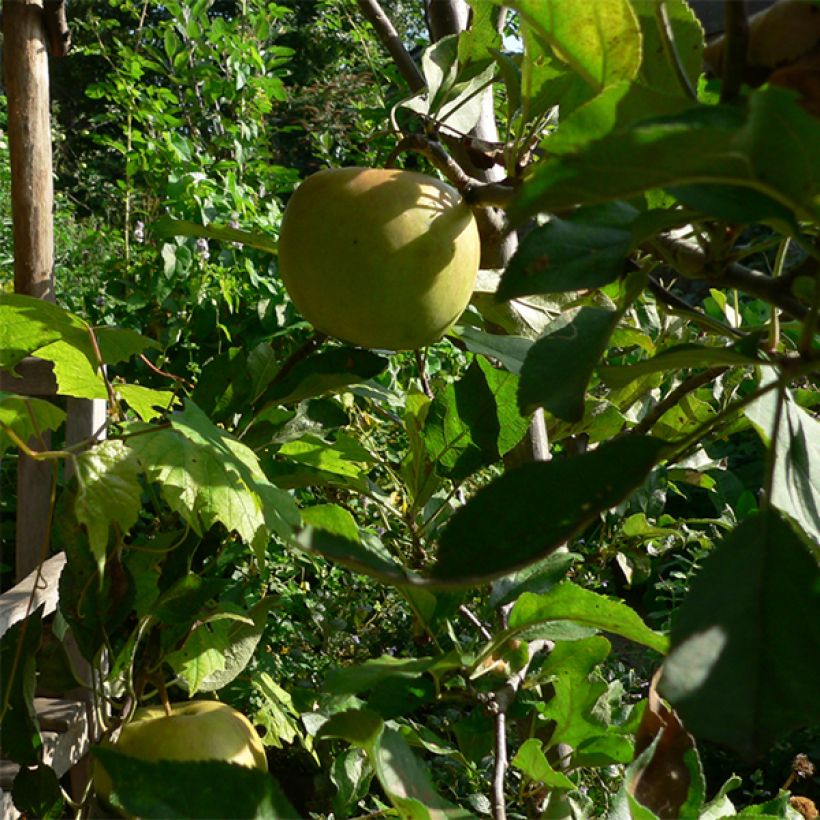

Plant habit
Fruit
Flowering
Foliage
Botanical data
Malus
domestica
Elstar
Rosaceae
Apple, Orchard apple, Table apple, Cultivated apple
Cultivar or hybrid
Other Apple trees
View all →Planting and care
Choose a sunny location for your Elstar Apple tree. The soil can be slightly alkaline or acidic but not excessively so. Dig a large planting hole at least 3 times the size of the root ball. Simultaneously add organic matter (topsoil, compost) and a base fertiliser such as crushed horn. Do not bury the graft collar. Stake if necessary. Water abundantly, even in winter, even if it rains.
Fruit trees are ideally planted between October and March, outside of frost periods. Container-grown plants can be planted all year round, except during periods of extreme heat or frost. The pruning of your apple tree can be limited to a simple thinning of dead or obstructive branches at the end of winter, in March. During the first 3 or 4 years, you can also encourage the formation of 4 or 5 main branches, resulting in a goblet-shaped habit, traditional in fruit tree cultivation. In any case, make sure to leave some space in the tree's structure for good air circulation and light. The Malus domestica Elstar produces a lot of apples, so don't hesitate to thin out the fruit clusters in June. Removing some fruits relieves fragile branches and helps achieve a better size.
You can also add a small handful of wood ash, rich in potash, during winter, which will improve fruiting. Monitor for possible aphid attacks during the season. Powdery mildew, a white powdery coating caused by a fungus, may appear on the leaves in summer, but it does not harm fruit development in gardens. Harvest takes place in September. Only store picked fruits. Apples should be stored with the stem facing downwards, on shelves or crates. Choose a preferably completely dark, dry, cool location, but frost-free.
Planting period
Intended location
Care
-
, onOrder confirmed
Reply from on Promesse de fleurs
Haven't found what you were looking for?
Hardiness is the lowest winter temperature a plant can endure without suffering serious damage or even dying. However, hardiness is affected by location (a sheltered area, such as a patio), protection (winter cover) and soil type (hardiness is improved by well-drained soil).

Photo Sharing Terms & Conditions
In order to encourage gardeners to interact and share their experiences, Promesse de fleurs offers various media enabling content to be uploaded onto its Site - in particular via the ‘Photo sharing’ module.
The User agrees to refrain from:
- Posting any content that is illegal, prejudicial, insulting, racist, inciteful to hatred, revisionist, contrary to public decency, that infringes on privacy or on the privacy rights of third parties, in particular the publicity rights of persons and goods, intellectual property rights, or the right to privacy.
- Submitting content on behalf of a third party;
- Impersonate the identity of a third party and/or publish any personal information about a third party;
In general, the User undertakes to refrain from any unethical behaviour.
All Content (in particular text, comments, files, images, photos, videos, creative works, etc.), which may be subject to property or intellectual property rights, image or other private rights, shall remain the property of the User, subject to the limited rights granted by the terms of the licence granted by Promesse de fleurs as stated below. Users are at liberty to publish or not to publish such Content on the Site, notably via the ‘Photo Sharing’ facility, and accept that this Content shall be made public and freely accessible, notably on the Internet.
Users further acknowledge, undertake to have ,and guarantee that they hold all necessary rights and permissions to publish such material on the Site, in particular with regard to the legislation in force pertaining to any privacy, property, intellectual property, image, or contractual rights, or rights of any other nature. By publishing such Content on the Site, Users acknowledge accepting full liability as publishers of the Content within the meaning of the law, and grant Promesse de fleurs, free of charge, an inclusive, worldwide licence for the said Content for the entire duration of its publication, including all reproduction, representation, up/downloading, displaying, performing, transmission, and storage rights.
Users also grant permission for their name to be linked to the Content and accept that this link may not always be made available.
By engaging in posting material, Users consent to their Content becoming automatically accessible on the Internet, in particular on other sites and/or blogs and/or web pages of the Promesse de fleurs site, including in particular social pages and the Promesse de fleurs catalogue.
Users may secure the removal of entrusted content free of charge by issuing a simple request via our contact form.
The flowering period indicated on our website applies to countries and regions located in USDA zone 8 (France, the United Kingdom, Ireland, the Netherlands, etc.)
It will vary according to where you live:
- In zones 9 to 10 (Italy, Spain, Greece, etc.), flowering will occur about 2 to 4 weeks earlier.
- In zones 6 to 7 (Germany, Poland, Slovenia, and lower mountainous regions), flowering will be delayed by 2 to 3 weeks.
- In zone 5 (Central Europe, Scandinavia), blooming will be delayed by 3 to 5 weeks.
In temperate climates, pruning of spring-flowering shrubs (forsythia, spireas, etc.) should be done just after flowering.
Pruning of summer-flowering shrubs (Indian Lilac, Perovskia, etc.) can be done in winter or spring.
In cold regions as well as with frost-sensitive plants, avoid pruning too early when severe frosts may still occur.
The planting period indicated on our website applies to countries and regions located in USDA zone 8 (France, United Kingdom, Ireland, Netherlands).
It will vary according to where you live:
- In Mediterranean zones (Marseille, Madrid, Milan, etc.), autumn and winter are the best planting periods.
- In continental zones (Strasbourg, Munich, Vienna, etc.), delay planting by 2 to 3 weeks in spring and bring it forward by 2 to 4 weeks in autumn.
- In mountainous regions (the Alps, Pyrenees, Carpathians, etc.), it is best to plant in late spring (May-June) or late summer (August-September).
The harvesting period indicated on our website applies to countries and regions in USDA zone 8 (France, England, Ireland, the Netherlands).
In colder areas (Scandinavia, Poland, Austria...) fruit and vegetable harvests are likely to be delayed by 3-4 weeks.
In warmer areas (Italy, Spain, Greece, etc.), harvesting will probably take place earlier, depending on weather conditions.
The sowing periods indicated on our website apply to countries and regions within USDA Zone 8 (France, UK, Ireland, Netherlands).
In colder areas (Scandinavia, Poland, Austria...), delay any outdoor sowing by 3-4 weeks, or sow under glass.
In warmer climes (Italy, Spain, Greece, etc.), bring outdoor sowing forward by a few weeks.






























